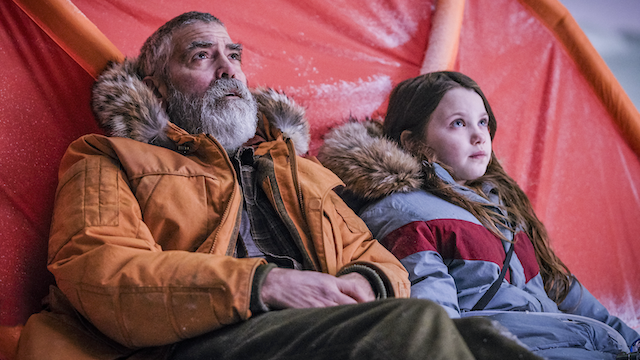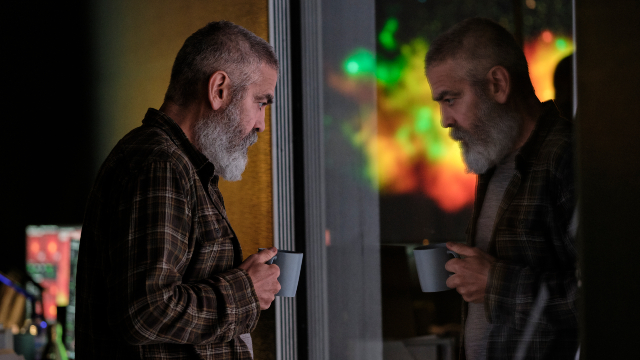Review: George Clooney’s The Midnight Sky
Earth is nigh-uninhabitable. Humanity has retreated to various space stations. Yet despite the apocalyptic circumstances, one steadfast fellow continues to do his job, the routine possibly keeping him alive. But it all changes when he unexpectedly meets a girl. George Clooney‘s The Midnight Sky may be based on the book Good Morning, Midnight, but it also plays like a live-action gritty reboot of WALL-E.
We’re never told what “The Event” is that made all but the polar ice caps uninhabitable, but we do know that Augustine (Clooney, who also directs) is as terminally ill as the planet. He even gives himself dialysis every day, in between generic meals and attempts to contact the various space stations. One, named Aether, is on its way back from the moons of Jupiter. And the crew aboard, led by David Oyelowo’s Adewole and Felicity Jones’ Rembshire, are blissfully unaware of why all their transmissions remain unanswered, assuming it’s a glitch and failing to guess an apocalypse.

And Augustine may not be as alone as he suspects. It appears a young child named Iris (Caoilinn Springall) missed the evacuations and is still in the Arctic station with him. Additionally, she either can’t or won’t speak. But together they’ll have to get to another, better protected station with superior communication equipment.
RELATED: George Clooney Defies Fate in The Midnight Sky Final Trailer
From there, the narrative divides its time between the journey of the Aether toward Earth, and the journey of Augustine and Iris to the next station. Occasionally, in between, we get flashbacks to a much younger Augustine, played by Ethan Peck. Yes, Clooney is now old enough to be played by a different young actor as an adult in flashbacks. And the same actor who plays a younger Leonard Nimoy on Star Trek: Discovery, no less.

Unlike WALL-E, this story does not feature a reversible cataclysm. Earth is doomed from the start, as is Augustine. No miracle is expected or inevitable. Like On the Beach, this is a doomsday movie about facing mortality. An unlikely coincidence late in the movie suggests it isn’t even necessarily meant to be taken literally. Rather, it’s more of a fable about regrets and reconciliation en route to one’s deathbed.
Indeed, the recasting of young Clooney adds to that thematic heft. All things in time must be replaced; when one’s watch is ended, the handover needs to be graceful. And to anyone dying, their whole world is ending. Casting that in more literal cosmic terms may help frame it for viewers who don’t feel their mortality as much. And for Augustine, it’s not just about reckoning with letting the next generation take it from here, but the degree to which helping the entire next generation of society has kept him from doing so more closely in his own family.
RELATED: Earth Is a Frozen Wasteland in George Clooney’s The Midnight Sky Trailer
As we all reckon with a significantly less catastrophic, but no less present global emergency, that’s a balance close to home. In our pandemic, keeping family close and at home is a benefit to the larger world. The Midnight Sky suggests that at one time, the same might have applied to Augustine, but that that ship, metaphorical and otherwise, has sailed.
During this awards season, you may encounter several more down-to-Earth movies dealing with similar issues. But none of them will have awesome virtual reality, Jupiter moonscapes, Arctic ice storms or the entire planet emitting dust clouds like Pig Pen. If we must deal with mortality, might as well do it in visual style.
Grade: 4/5
The Midnight Sky is now on Netflix.
Recommended Reading: Good Morning, Midnight




